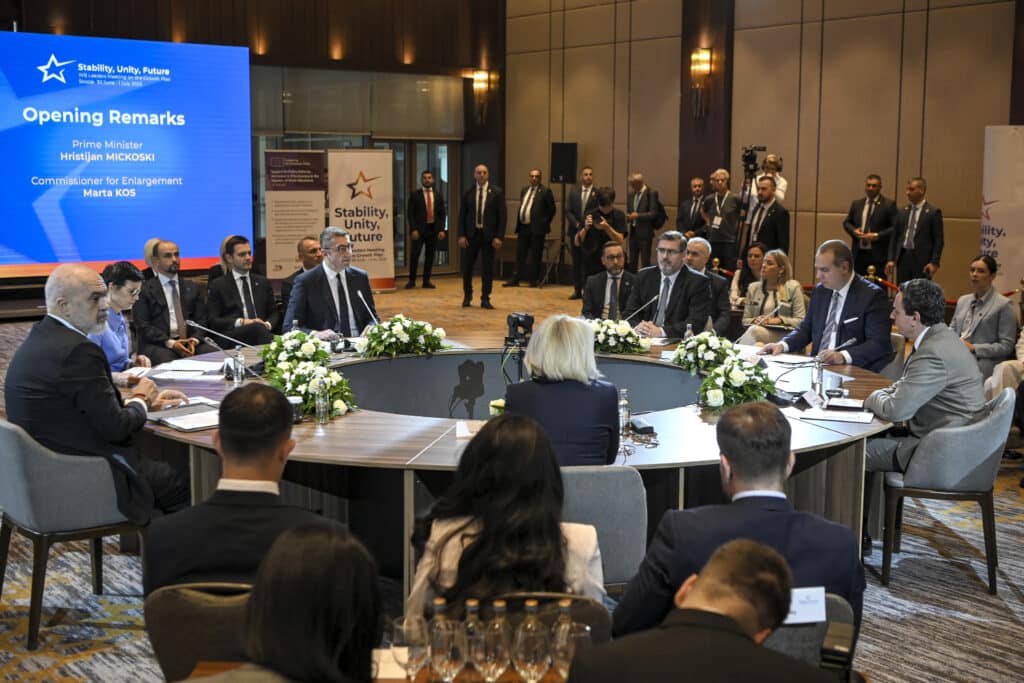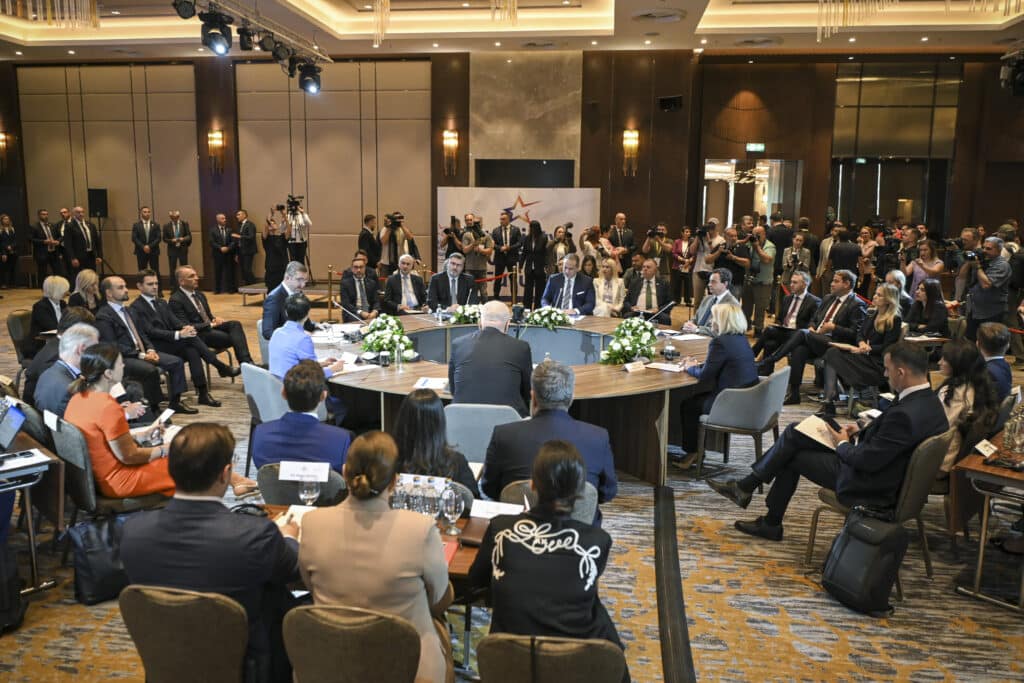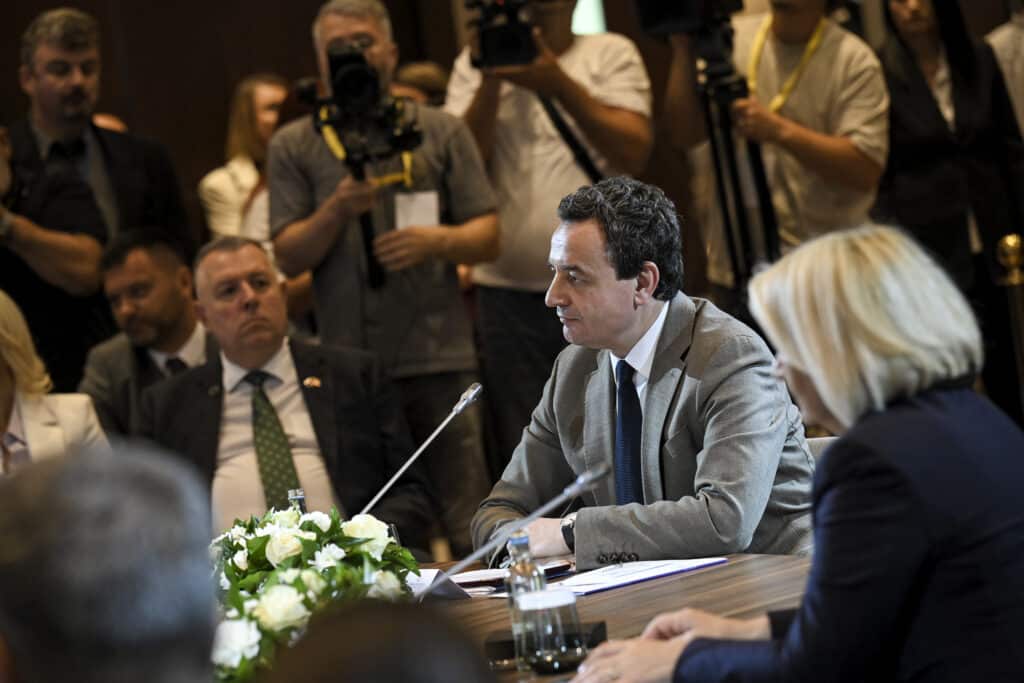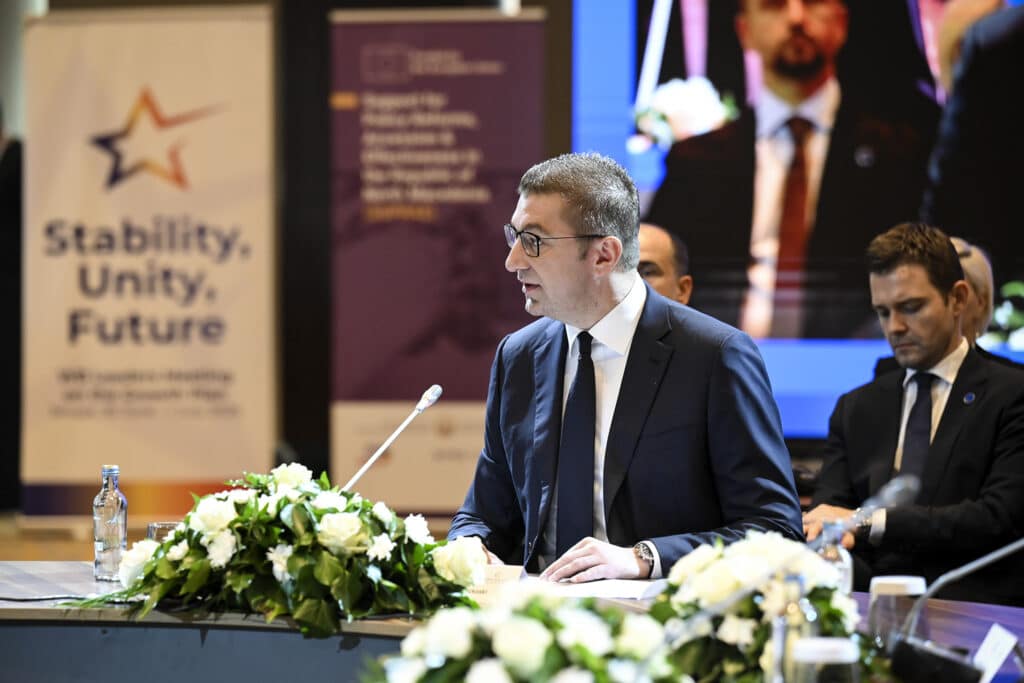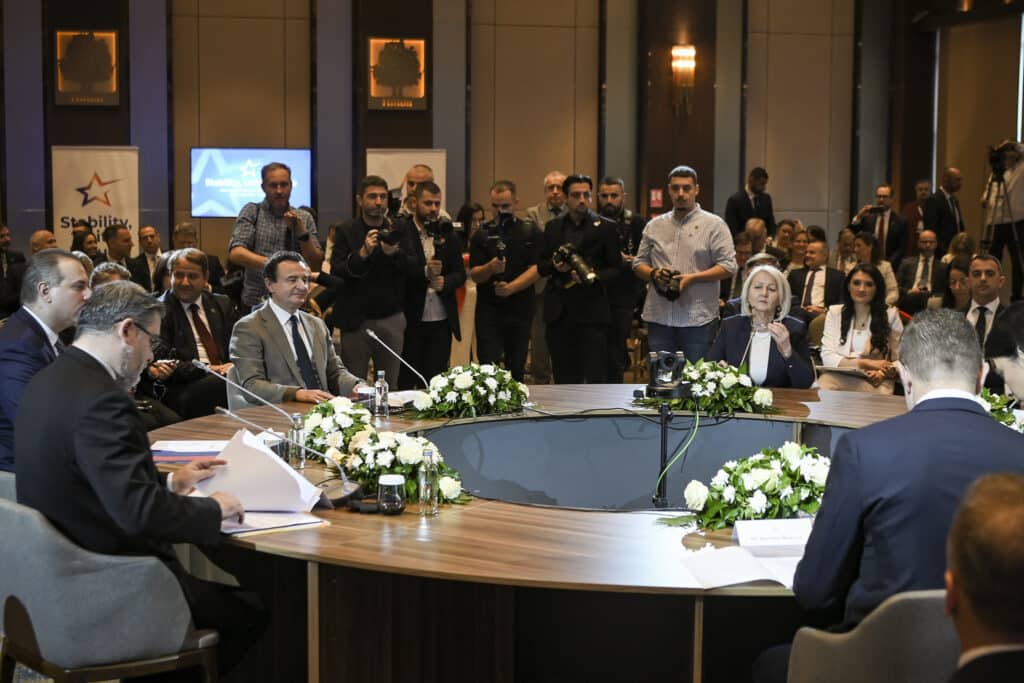Skopje/Shkup, 1 July 2025
Acting Prime Minister of Republic of Kosova, Albin Kurti’s full remarks during the leaders’ panel discussion in the Western Balkans Leaders Meeting on the EU Growth Plan in Skopje/Shkup:
Dear Prime Minister of the Republic of North Macedonia, Mr. Hristijan Mickoski,
Dear Commissioner for Enlargement, Madam Marta Kos,
Dear colleagues from the region,
Dear representatives of regional organizations.
Let me begin by thanking Prime Minister Mickoski for bringing us back to Skopje/Shkup for the second time to discuss the Growth Plan.
The European Union’s Growth Plan is the right response to accelerate reforms. We need investments aligned with the EU’s economic security, and we need access to financing that match both our ambition to reform and our democratic progress and shared values. Yes, the Growth Plan promises more funding than IPA currently provides, but we can do more. The EU can and should increase funding, and we can and should accelerate reforms.
To put this in perspective, let me use the example of Croatia, our very good friend and partner, and a model of reform on the path to EU membership. Between 2014 and 2020, Croatia received roughly €12 billion in EU funding, averaging around €1.7 billion per year. In contrast, the Western Balkans Six (WB6) collectively received about €600 million annually, or roughly €4 billion over the same period.
On a per capita basis, the Western Balkan Six received less than 9% of what Croatia received. The point I want to make is this: if we are to catch up with the EU’s most recent member, significantly more funding from the EU will be necessary and that funding should be linked with EU rules and values.
Also, the guiding principle should be that what we are equally required to reform, we must be equally positioned to benefit from. This means access to programs and instruments that enable reforms and growth. Kosova still lacks access to key programs for trade, such as Common Transit Convention and EU standardization organizations such as the European Committee for Standardization/ European Committee for Electrotechnical Standardization (CEN/CENELEC). This also applies to access to green transition funding. We lack access to climate finance, and the EU’s unjust and harmful measures have delayed projects and stalled reforms in areas of energy and growth, which goes against the very logic of the Growth Plan.
Since our last meeting in Kotor (Montenegro), we have adopted a new Action Plan for Common Regional Market, agreed to revise the Green Agenda, unblocked CEFTA and signed many decisions on the CEFTA Joint Committee, and signed a new agreement on Access to Study on the Berlin Process.
Later this year, London will host us for the Berlin Process. While it is tempting to make new commitments, we must first deliver on the ones already made. The agreement on diplomas is crucial for worker mobility, just like the ID card is for freedom of movement. After our decision to lift visa restriction for Bosnia and Herzegovina, between January and June of this year, the number of citizens crossing the border from Bosnia and Herzegovina to the Republic of Kosova rose from a few hundred to nearly ten thousand. As Bosnians can now travel freely to Kosova, so too must our citizens be able to travel freely to Bosnia and Herzegovina.
Regarding the Growth Plan, we support the proposals on Tourism, Consumer Protection, and the Single Market Highway. We strongly support nearshoring, which should also be friendly shoring, and we see it as a great opportunity not only for our region but for the EU as well.
We see potential for cooperation in the following sectors:
- Competitive digital services, including software development, cybersecurity, AI, and structured technologies;
- The defense sector; and
- Agriculture and food processing.
We have progressed on previously identified areas of the Pillar one, and we are continuing our work. Up to date, we have:
- Inaugurated two joint border crossing points with North Macedonia, one at “Hani i Elezit – Bllacë”(on April 12 2025) and the second “entry-entry” at “Glloboçicë–Jazhincë” (on May 28 2025). A joint border control point with Albania at Vermicë is also fully operational. We want more green lanes- safe and secure, which enable us to move and trade faster.
- Completed the legislative framework for the Single European Payment Area (SEPA) application and submitted the pre-application. We would welcome EU’s review and assessment so we can proceed swiftly with the finalization of our application when the situation permits.
- Our national electronic identification system, modeled after the EU’s Digital Identity Wallet, is being piloted- it offers electronic authentication, signatures, seals, and a digital wallet. We have set September as the deadline for launching it.
- Identified 34 municipalities to benefit from the WIFI4WB initiative. We excel in digitalization and champion with high bandwidth penetration.
- We commend the EU proposition for Agreement on Conformity Assessment. Of course, the products accredited and marked in accordance with the EU regulation should be accepted within the WB6.
- The Digital Innovation Hubs Programme has recognized our first European Digital Innovation Hub (EDIH)- a major regional hub for entrepreneurship, innovation, and skills development, located on a 40 hectares site of a former KFOR military camp on the outskirts of city of Prizren.
As CEFTA Chair, we are working to advance long-delayed processes that will make CEFTA more efficient and equitable for all members. We are currently in the process of selecting a new CEFTA Director, but as I’ve raised before, regional organizations need a reform plan.
Too much energy, political capital, and administrative resources are being spent on selecting directors and secretaries rather than delivering tangible results for our citizens. A rotation system for high-level positions, along with targeted recruitment at the staff level and a fairer distribution of headquarters and activities, would significantly improve functionality and professionalism in regional forums.
Allow me to briefly at the end address matters of security, which are a prerequisite for growth. As a region, we are not isolated from the global geopolitical landscape. Russia’s war of aggression against Ukraine continues to threaten European security, while tensions in the Middle East further contribute to global volatility. We welcome the action of the United States to prevent Iran from obtaining a nuclear weapon. The world is undoubtedly safer without nuclear arsenals in the hands of authoritarian regimes.
Our meeting today comes just days after the NATO Summit in The Hague, where a renewed commitment was made to increase defense spending to 5% of GDP. We welcome this pledge. It is a necessary step to both protect the Euro-Atlantic alliance and deter autocratic regimes from provoking further conflict. A stronger Europe is a Europe that can defend itself.
Thank you very much.
